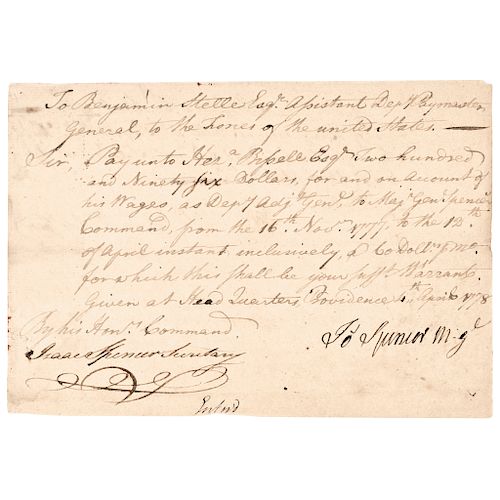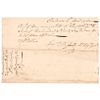1778 JOSEPH SPENCER Continental Army Major General Signed Manuscript Document
Lot 100
Categories
Estimate:
$800 - $1,000
Absentee vs Live bid
Two ways to bid:
- Leave a max absentee bid and the platform will bid on your behalf up to your maximum bid during the live auction.
- Bid live during the auction and your bids will be submitted real-time to the auctioneer.
Bid Increments
| Price | Bid Increment |
|---|---|
| $0 | $10 |
| $200 | $20 |
| $300 | $25 |
| $500 | $50 |
| $1,000 | $100 |
| $2,000 | $200 |
| $3,000 | $250 |
| $5,000 | $500 |
| $10,000 | $1,000 |
| $20,000 | $2,000 |
| $30,000 | $2,500 |
| $50,000 | $5,000 |
| $100,000 | $10,000 |
| $200,000 | $20,000 |
| $300,000 | $25,000 |
| $500,000 | $50,000 |
About Auction
By Early American History Auctions
Oct 19, 2019
Set Reminder
2019-10-19 12:00:00
2019-10-19 12:00:00
America/New_York
Bidsquare
Bidsquare : Historic Autographs-Currency-Political-Americana-Militaria-Guns
https://www.bidsquare.com/auctions/early-american-history-auctions/historic-autographs-currency-political-americana-militaria-guns-4513
326 Lots of Rare, Historic Autographs, Americana, Civil War Era, George Washington, Abraham Lincoln, Black History, Revolutionary War Era, Colonial America, Federal Period, War of 1812, Colonial Currency, Indian Peace Medals & more... Early American History Auctions auctions@earlyamerican.com
326 Lots of Rare, Historic Autographs, Americana, Civil War Era, George Washington, Abraham Lincoln, Black History, Revolutionary War Era, Colonial America, Federal Period, War of 1812, Colonial Currency, Indian Peace Medals & more... Early American History Auctions auctions@earlyamerican.com
- Lot Description
Autographs
Major General Joseph Spencer Signed Continental Army Pay Order Dated April 4, 1778 he Resigned on June 14th!
JOSEPH SPENCER (1714-89). American Revolutionary War Officer, Delegate to the Continental Congress, as Brigadier General in April 1775 he led the 2nd Connecticut Regiment at the Siege of Boston and in 1776 was promoted to Continental Army Major General in the Eastern Department, resigned his commission on June 14, 1778.
April 4, 1778-Dated American Revolutionary War Period, Manuscript Document Signed, "Jos Spencer M: gl" (Major General), measuring 5" x 7.25" at Head Quarters, Providence, Choice Very Fine. A very clean, high quality and original Document ordering Benjamin Stelle as Assistant Deputy Paymaster General, to pay, in part:
"Heza. Bissell Two hundred and Ninety six Dollars, for and on Account of his Wages, as Depy Adj Genl to Majr Genl Spencer Command, from the 16th Novr. 1777 to the 12th of April instant...".
Only a scant two months and ten days later, Major General Spencer would resign his commission on June 14, 1778 and leave the Continental Army. Inlaid to slightly larger paper for display. A very rare signature as Major General Joseph Spencer died in 1789.
JOSEPH SPENCER (1714-89) was trained as a lawyer and practiced until 1753, when he became a judge. He was active in the militia, serving in King George's War and as a Lieutenant Colonel of the Middlesex militia in the French and Indian War.
By the time the American Revolution began, Spencer had advanced to Brigadier General of Connecticut's militia, and in April 1775 he led them to support the Siege of Boston as the 2nd Connecticut Regiment. In June, when these units were adopted into the national army, he was made a brigadier general in the Continental Army; he was amongst the first eight Continental Army Brigadier Generals so appointed.
In 1776, Spencer was promoted to Major General in support of William Heath in the Eastern Department. The following year his military career became difficult. He cancelled a planned attack on British forces in Rhode Island and was censured by the Continental Congress. He demanded a court of inquiry and was exonerated, but when the controversy was resolved, he resigned his commission on June 14, 1778.
Spencer first served on the Connecticut Council (or Connecticut State Senate) in 1776. Free of military responsibility, the state sent him as a delegate to the Continental Congress in 1779. In 1780, he was returned to the council, and served there until his death.
- Shipping Info
-
Early American provides in-house worldwide shipping. Please contact us directly if you have questions about your specific shipping requirements.
-
- Buyer's Premium



 EUR
EUR CAD
CAD AUD
AUD GBP
GBP MXN
MXN HKD
HKD CNY
CNY MYR
MYR SEK
SEK SGD
SGD CHF
CHF THB
THB












